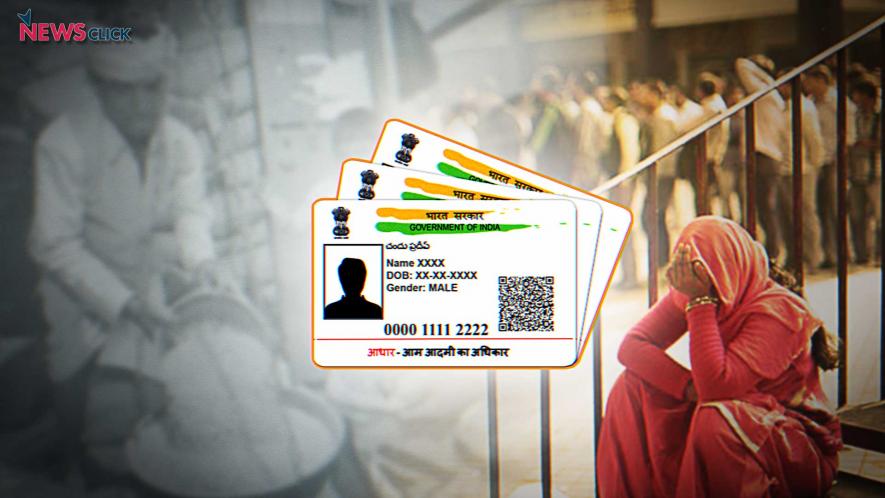Aadhaar-Voter ID Linking May Have Disenfranchised Millions

A controversial programme to link AADHAAR to Voter IDs by the Election Commission in 2015 with the stated purpose of “purification” of Electoral Rolls may have disenfranchised millions of citizens. In this process, the data of millions of citizens was shared in a manner that violated their fundamental right to privacy.
In March 2015, the Election Commission launched the “National Electoral Roll Purification and Authentication Programme” throughout the country with the aim of cleansing the voter rolls of duplicates and ‘ghost’ voters. The programme ran for several months, till August 2015, when it was stopped after the Supreme Court issued an interim order that restricted the use of AADHAAR for purposes other than distribution of welfare benefits, such as food grains, LPG, kerosene, etc. However, significant and lasting damage had already been done and it is feared that millions of citizens may have been struck off the voter rolls in those few months. The Chief Election commissioner himself admitted in May 2015, a few months after the programme had started, that “various representations/complaints have been received in the Commission suspecting that a number of deletions of names of voters from the electoral rolls.”
In Telangana, one of the states that served as a template for the wider, national roll-out, election officials have admitted that more than 2 million voters were struck off the electoral rolls.
While the EC maintains that this linking was done with the consent of the voters, multiple RTI responses and the speed with which voters were linked indicate otherwise. The Chief Election Commissioner, O.P. Rawat, claimed earlier this year that 320 million AADHAAR Numbers had been linked up with Voter IDs in just three months and that once the Supreme Court gave its nod, the remaining 545 million votres would be linked up. Is it possible to link up to 320 million numbers while getting consent from voters by going to every voter’s house in 3 months? The statistics from Maharashtra shed some light on this. Out of 1.8 million numbers which were linked, according to the Maharashtra EC CEO, only 300,000 cases were voluntary. At the national level, according to the CEC in May 2015, out of 130 million numbers linked, only 30 million had applied online. The rest were obtained through “other means”.
So, what were these “other means”? Information obtained from RTI requests reveal that in at least 4 states - Tamil Nadu, Gujarat, West Bengal and Uttar Pradesh - the Election Commission accessed the National Population Register (NPR) database for this linking. RTI responses also confirm that the EC used a software called DSDV, which can automatically link AADHAAR numbers to any beneficiary database. This software would have been used to match voter details present in electoral rolls such as name, date of birth, address, etc. with AADHAAR databases. Since the data in electoral rolls could differ from the AADHAAR database, a person’s name could appear as “S Krishna” in the electoral rolls and as “Siva Krishna” in the AADHAAR Database. Taking into consideration such situations, the DSDV program algorithmically assigns a score for every voter. Voters with more than 50% score would be deemed to have an AADHAAR match and their AADHAAR number would automatically get linked. Voters with less than 50% score would be flagged for verification. Election officials would be sent on door-to-door surveys to verify these voters. If the voter couldn’t be contacted through this survey, say if their house was locked when the official visited, their names would be struck off the electoral rolls.
This method is deeply problematic at many levels. The use of the DSDV software itself is illegal as the sharing of AADHAAR identity information is prohibited for any purpose other than in accordance with provisions of the AADHAAR Act. The Act does not have any provision for the use of DSDV. Also, the AADHAAR Act explicitly states that AADHAAR information can only be used for online authentication and nothing else. In this case, it was shared with a third party – the Election Commission - without the voters’ consent or even knowledge, thereby violating their fundamental right to privacy. On top of this, AADHAAR is not even a proof of citizenship as all Indian residents can legally have an AADHAAR card. So how can it be used to disenfranchise citizens?
Aside from legal issues, there are several technical issues as well. Since the software cannot obtain exact matches, partial matches were being used to strike off voters. Similarly, potentially incorrect matches could be made between AADHAAR numbers and Voter IDs, causing problems both for the AADHAAR & Voter ID holders. Also, given the widespread fraud and issues with biometrics matches in the AADHAAR database, the electoral rolls themselves could be polluted with ghost AADHAAR number holders.
It is deeply troubling that such an illegal and unconstitutional exercise was carried out brazenly by both the Election Commission and the UIDAI, affecting something as critical as the right to vote of citizens and their fundamental right to privacy. Given the recent judgement by the Supreme Court on AADHAAR, the government must ensure that the linking of AADHAAR to Voter IDs is undone and the EC databases which maintain such linking are wiped. All voters who were disenfranchised through this process should also be brought back into the rolls. Unfortunately, the Election Commission seems not just unrepentant but eager to resume this linking process. The Madras High Court recently issued a notice in a petition appealing for linkage of Aadhaar with Voter ID. In response, the Election Commission informed the court that it supports the petition and the linking of AADHAAR with Voter IDs.
Get the latest reports & analysis with people's perspective on Protests, movements & deep analytical videos, discussions of the current affairs in your Telegram app. Subscribe to NewsClick's Telegram channel & get Real-Time updates on stories, as they get published on our website.
























